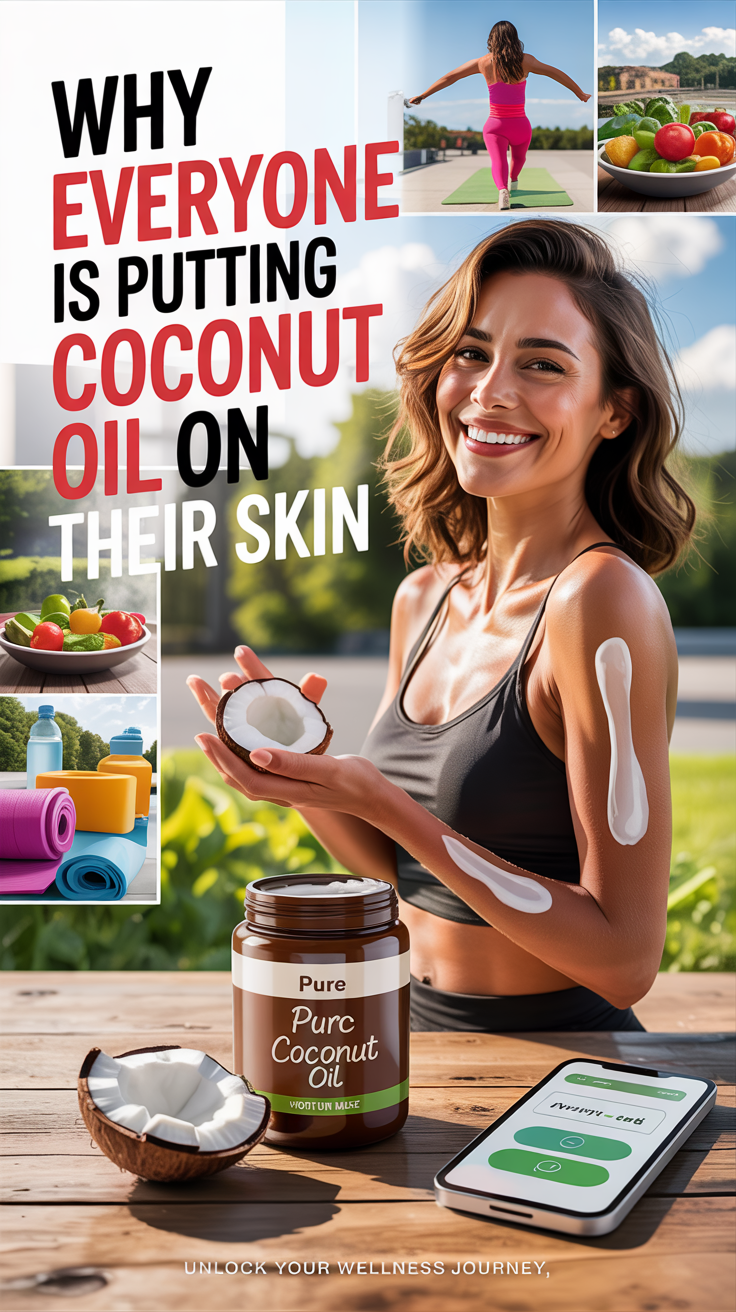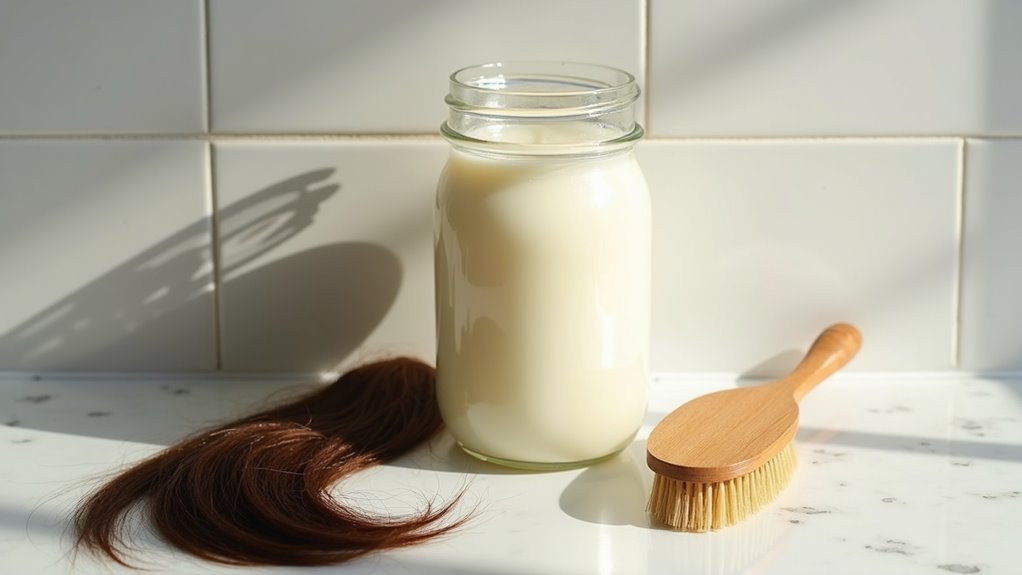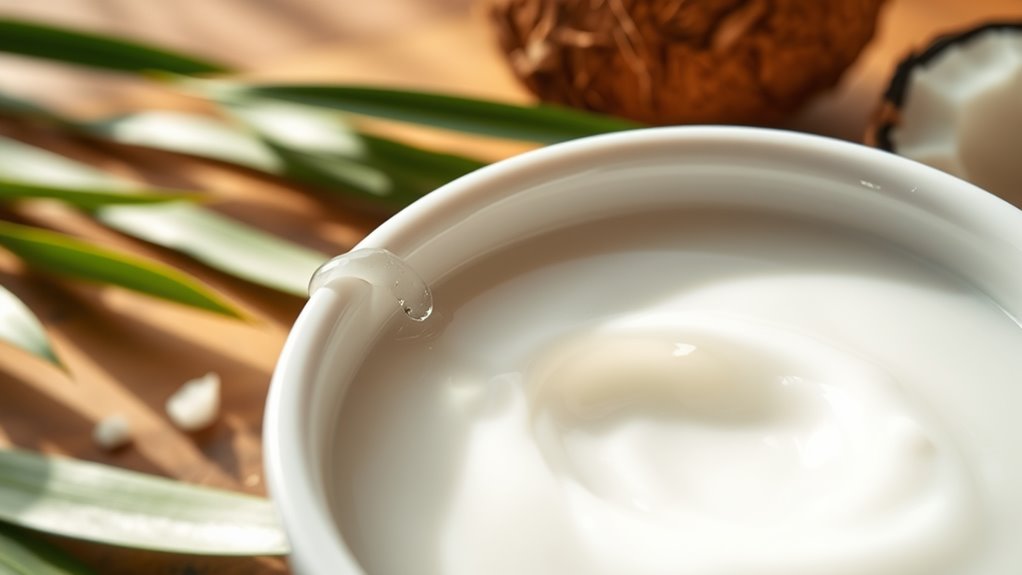Why Everyone Is Putting Coconut Oil on Their Skin
Coconut oil is popular for skincare due to its impressive moisturizing capabilities and anti-inflammatory properties. It helps enhance skin hydration, improves barrier function, and soothes irritations while being safe for multiple skin types. The unique fatty acids, particularly lauric and linoleic, provide antimicrobial benefits that can combat acne and promote healing. Its low irritation profile means you can use it confidently, even if you have sensitive skin. You’ll find even more benefits revealed as you explore further.
Benefits of Skin Hydration With Coconut Oil
Coconut oil offers numerous benefits for skin hydration, making it an excellent choice for maintaining moisture levels.
Its fatty acids, such as lauric and linoleic acids, enhance moisture retention by forming an occlusive barrier that prevents transepidermal water loss. Clinical studies show that using coconut oil increases skin hydration by 24.8% over 28 days, outpacing standard lotions. Additionally, it improves skin elasticity and repairs the skin barrier, reducing moisture escape and improving elasticity. Its solid lipid particles further enhance moisturization, making coconut oil uses effective for combating dryness and reinforcing the outer skin layers, ensuring a healthier, hydrated complexion. Furthermore, the unique molecular structure of coconut oil allows it to penetrate the skin effectively, delivering essential nutrients and promoting overall skin health.
Anti-Inflammatory Properties and Their Impact on Skin
Coconut oil’s anti-inflammatory properties can effectively suppress inflammatory markers in your skin, which is crucial for managing conditions like dermatitis and eczema. Its antioxidant effects help combat free radicals that contribute to skin inflammation, promoting better overall skin health. Additionally, its non-irritant profile makes coconut oil suitable for a variety of skin types, further supporting its use in skincare regimens focused on inflammation reduction. Notably, it also enhances skin barrier function, providing an extra layer of protection against irritants. This protection is largely due to its high concentration of medium-chain fatty acids, which contribute to the skin’s resilience.
Inflammatory Marker Suppression
The anti-inflammatory properties of virgin coconut oil (VCO) play a crucial role in supporting skin health by effectively suppressing inflammatory markers. By reducing inflammation, VCO addresses conditions like dermatitis and eczema, enhancing skin barrier function. This decreased inflammation aids in hydration, ensuring your skin remains moisturized and protected. Additionally, VCO may assist in managing chronic skin inflammation due to its therapeutic benefits. Clinical studies have demonstrated its effectiveness in suppressing inflammatory markers, confirming its non-irritant nature and suitability for sensitive skin. Furthermore, its antibacterial properties help in preventing infections, promoting overall skin health.
Antioxidant Boosting Effects
While exploring skin health, you’ll find that the antioxidant boosting effects of virgin coconut oil (VCO) are significant. These antioxidants help reduce oxidative stress, stabilizing free radicals that cause skin damage. The anti-inflammatory properties of VCO contribute to its effectiveness in minimizing irritation, promoting wound healing, and enhancing skin barrier function. Additionally, VCO boasts antimicrobial effects that can aid in treating acne, further supporting its role in maintaining healthy skin.
| Benefit | Mechanism | Result |
|---|---|---|
| Reduces oxidative stress | Stabilizes free radicals | Minimizes skin damage |
| Enhances collagen production | Supports skin elasticity | Improves skin firmness |
| Supports wound healing | Creates stable environment | Accelerates tissue repair |
| Protects against inflammation | Reduces redness and irritation | Promotes skin calmness |
Non-Irritant Profile Benefits
Reducing oxidative stress with virgin coconut oil (VCO) is only part of its capability; it also boasts a remarkable non-irritant profile that makes it suitable for various skin types. VCO exhibits significant anti-inflammatory effects by suppressing inflammatory cytokines, which helps alleviate conditions like dermatitis and eczema. Its high IC50 value demonstrates minimal irritation, while phototoxicity tests confirm safety upon sun exposure. Additionally, VCO may reduce stretch mark appearance through its antioxidants and anti-inflammatory effects. Topical application reduces redness from UVB damage, enhancing comfort in inflamed skin.
The Role of Coconut Oil in Acne Treatment
Coconut oil plays a multifaceted role in acne treatment due to its antibacterial properties and ability to reduce inflammation.
Its composition, particularly lauric acid, effectively targets Propionibacterium acnes, providing a potential advantage over traditional treatments. Additionally, its medium-chain fatty acids contribute to nourishing the skin and promoting healing.
Understanding proper application techniques can help maximize its benefits while minimizing risks associated with comedogenicity.
Antibacterial Properties Explained
The antibacterial properties of coconut oil, notably attributed to its high lauric acid content, make it an intriguing option for addressing acne.
You’ll find several key benefits:
- Antibacterial Action: Lauric acid disrupts bacterial cell membranes, reducing acne-causing bacteria.
- Skin Barrier Repair: Coconut oil enhances skin barrier function, preventing moisture loss.
- Moisturizing Effect: It hydrates your skin, supporting the healing process.
While coconut oil’s antimicrobial properties can be beneficial, remember it’s comedogenic and may not suit everyone.
It’s best used as a complementary treatment rather than a primary remedy for acne.
Further research is needed to solidify these claims.
Reducing Inflammation Effectively
Exploring strategies to alleviate inflammation in acne treatment reveals promising insights regarding coconut oil.
Its medium-chain fatty acids, particularly lauric acid, effectively reduce inflammation and inhibit inflammatory markers like TNF-alpha.
Research indicates that applying virgin coconut oil can significantly decrease papules and pustules, improving overall acne severity.
Moreover, it enhances collagen production, crucial for quicker wound healing and minimizing scarring.
By keeping your skin hydrated, coconut oil not only reduces irritation but also strengthens the skin barrier, which helps prevent further inflammation.
While promising, further human studies are needed to solidify similar results for widespread application.
Application Techniques for Acne
After understanding how coconut oil reduces inflammation, it’s important to consider how to apply it effectively for acne treatment. You should utilize these techniques:
- Spot treatment: Target individual blemishes to minimize pore blockage.
- Short-contact therapy: Apply for 5-10 minutes, then rinse to mitigate bacterial load.
- Carrier oil dilution: Blend with non-comedogenic oils like jojoba to balance benefits and clogging risk.
Evening application is best to avoid daytime oil buildup, and always patch test on the jawline to evaluate your skin’s tolerance.
Enhancing Barrier Function With Coconut Oil
Coconut oil significantly enhances skin barrier function, making it a valuable addition to your skincare routine.
Its rich composition, particularly lauric and linoleic acids, effectively moisturizes and repairs the skin’s barrier, improving hydration and reducing transepidermal water loss.
By creating a protective layer, it minimizes environmental stressors and prevents irritation.
Coconut oil’s emollient properties promote resilience by sealing moisture, while its anti-inflammatory compounds support skin health without causing irritation.
Research shows that it increases moisture content and decreases dead skin cells, solidifying its role in maintaining an effective and strong skin barrier essential for overall skin health. Additionally, its antimicrobial properties can further support skin health by preventing infections and promoting healing.
Antimicrobial Effects Against Skin Infections
The protective benefits of coconut oil extend beyond enhancing the skin barrier; they also play a significant role in combating skin infections.
With its unique composition, coconut oil showcases exceptional antimicrobial properties:
- Lauric Acid: Disrupts microbial cell membranes, preventing infections.
- Broad-Spectrum Protection: Effective against bacteria, fungi, and viruses, including Staphylococcus aureus.
- Moisturizing Properties: Maintains skin health, enhancing your skin’s defense against pathogens.
Studies indicate significant reductions in bacterial colonization in atopic dermatitis patients, supporting coconut oil’s efficacy as a preventive agent in skin infection management. Additionally, its antimicrobial properties can soothe irritated skin, making it an optimal choice for various skin conditions.
Embrace its protective qualities for healthier skin.
Safety and Tolerability of Coconut Oil for All Skin Types
When considering skincare options, understanding the safety and tolerability of coconut oil is essential for all skin types. Studies confirm it’s generally safe for use due to low irritation potential. While it hydrates effectively, you should avoid applying it on acne-prone skin to prevent clogging pores. Additionally, its antimicrobial properties help maintain skin’s microbiome for a healthier complexion.
| Skin Type | Safety Level |
|---|---|
| Sensitive Skin | High tolerability, non-irritant |
| Normal/Dry Skin | Beneficial emollient properties |
| Oily/Acne-Prone | Caution advised, may cause breakouts |
Coconut oil’s versatility makes it an attractive choice, but individual responses can vary, so patch testing is wise.








